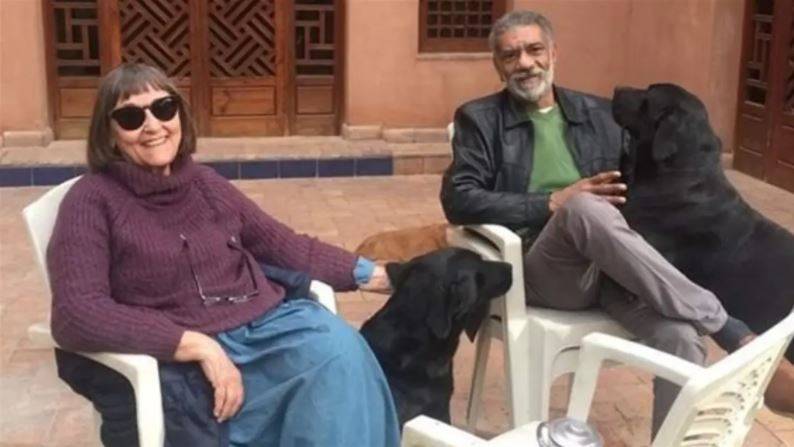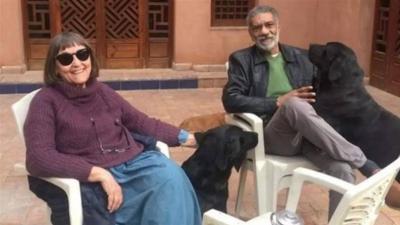A shocking revelation has emerged from the second wife of famous Egyptian artist Sayed Ragab. Kiki Nislaion, an American citizen, accused Ragab of taking her money and evicting her from their home. She explained in a post titled "Behind the Scenes with Abu El-‘Arousa Sayed Ragab" on her Facebook page that he expelled her from their house in Dahshur, located in Giza Governorate south of Cairo, denying her rights.
She added that she "did not want to present the problem to the public this way, but she decided now to tell her story, considering that 'the man she married and trusted' cannot do this."
**Denied Entry**
Moreover, she mentioned that she "went to her house a few days ago to make sure everything was fine, preparing to welcome some friends the next day, but she was surprised to be denied entry." Ragab had brought security personnel and ordered them to prevent her from entering her property and home.
She pointed out that she and Sayed had agreed to separate amicably without divorcing, so she could maintain her health insurance and residence in Egypt. They also agreed that he would pay her a suitable monthly allowance and help her find appropriate housing. However, over time, for no reason, Ragab refused to sign the agreement.
She stated, "In June, without discussion, I received a notice of unilateral divorce from the property guardian," adding that this divorce naturally deprived her of all her rights unless she pursued legal action. She clarified that "the cases have been in court for months, while the Egyptian artist has refused to communicate with her during this period, and she has not received anything from him since April."
**Supported Him and Helped Him**
She continued, noting that "Ragab was working in a factory when I met him," emphasizing that she bought their apartment from her savings in 2002. Furthermore, she indicated that they lived in that apartment for 15 years, after Sayed was able to start his artistic career through her connections in the artistic community in Egypt.
She revealed that "in 2009, when her husband was taking his first steps in the industry, she suggested buying a piece of land in Dahshur with her money. She indeed bought it in his name because she is not Egyptian."
**"He Forced Me to Do That"**
She also confirmed that "her ex-husband bought a small piece of land adjacent to that land and wrote her a half-bill of sale, while he kept the original sale contracts." However, she explained that she did not demand it because he was her husband, until she later discovered that he denied her rights.
Nislaion added, "I had to tell these details because he forced me to after denying everything I did for him and his children out of love and affection, knowing that I also bore the expenses of daily life, the gifts, and requests I brought back from every trip to America."
**"How Can He Deny a 21-Year Relationship?"**
She clarified that she was very loyal to this relationship and helped him a lot through her connections, pointing out that he acknowledged this assistance in many television interviews, admitting that the fame and status he enjoys today are due to her support. However, she questioned: "How can he deny all of this? How can he deny a 21-year relationship in which I invested all my savings, only to find myself unable to pay for regular cancer check-ups?"
**"I No Longer Have an Income Source"**
She added: "I have ended my professional life and no longer have a source of income to ensure a decent living. The harshest thing is the children of Sayed Ragab cutting ties with me," ending her post by saying: "I regret to inform you, my dear friends, about the true story of Abu El-‘Arousa."
It’s worth mentioning that Ragab was born in 1950. He made his acting debut in the film "Small Dreams" and later participated in numerous works. He worked as an engineer in mechanics at the Nasr Automotive Company in the 1990s for over 20 years. During his artistic career, he participated in several famous films and series, the latest being the series "Abu El-‘Arousa," which captured the attention of Egyptians by addressing situations and daily life problems faced by Egyptian families.




